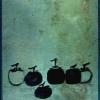-
Content count
9 -
Joined
-
Last visited
About Gnu Mind?
-
Rank
Dao Bum
-
Wu Ming Jen, I love that sign. "If we are separate from nature what harm can we do. If we are nature why would we harm ourselves." Yes! The problem, as you point out, is a third alternative, that "we like to think we are . . . separate from nature" (if I may add italics). So that our destructive "nature" which I mention above is simply the result of "mental illness" and not genuine Te. (I had been thinking that ignorance is the problem, but "mental illness" captures the bizarre perversity much better.) Perhaps this problem will go away by itself in time, since as the environment continues to degrade it will become harder and harder to maintain the fiction that humans are separate from nature. I find your remarks extremely illuminating and helpful. Thank you very much.
-
Harmonious Emptiness, thanks for starting this thread. I have a couple of related questions that might be of interest here (they are certainly of interest to me). (1) How can we determine what kinds of human-nature interactions follow the Dao, and what kinds do not? For sure humans produce enormous negative changes in ecosystems, but then so do many animals, and even plants. It seems that any "natural" expression of Te (i.e., any Wu-Wei-type action) has to be in accord with the Dao. Yet, one of the things human beings do, apparently naturally, is harm nature, for example by concocting harmful things (like paving, many chemicals, etc.), or by depleting nature directly (mining, logging, etc.). (2) Daoism is obviously a very attractive approach to life, and as such it would be wonderful if it could be applied to solve, or anyway mitigate, big problems (e.g., anything from big personal problems to planetary ones). Yet we are told in DDJ 63 and 64 to solve problems before they get big, or even before they even begin to exist. So, is a Daoist powerless to address serious problems? Stated another way, is the most a Daoist can do is wait/hope for a yin/yang reversal and then hope for harmony? I am interested in this as a rabid tree-hugger. It sure would be nice if, somehow, Taoist "principles" could be applied to human actions concerning the environment. Here is how I see the questions relating to one another. Unless we can get some useable idea about what possible kinds of human action are anti-Dao (question 1), there is no hope for coming up with the principles of Q2. Best to all, GM
-
Hey, thanks you all. I realize I'm getting into a major project here, in fact one that may not be completed in my lifetime (I'm 62). But if I held off on the grounds that "I'm too old to start"--possibly a subconscious reason to have delayed already for so long--then I may as well be dead anyway, so what the heck. Maybe this will be Taoist magic to keep me young :-) best, GM
- 12 replies
-
- reading Chinese
- learning Chinese
-
(and 1 more)
Tagged with:
-
Harmonious Emptiness and lienshan, Thanks! Those are two more really helpful books, which I will obtain ASAP (maybe just printing out the PDF, that one looks hard to find). I really appreciate the helpful responses. So glad I stumbled onto this site. GM
- 12 replies
-
- reading Chinese
- learning Chinese
-
(and 1 more)
Tagged with:
-
For those who are interested I can recommend a Classical Chinese grammar that is intended (among other things) to aid self-study, and which in fact seems pretty accessible: Du's Handbook of Classical Chinese Grammar, by Archie Barnes, Don Starr and Graham Ormerod (Alcuin Academics, 2009). With this and the wonderful Jonathan Star TTC recommended above, all of a sudden getting below the translations seems reasonably doable over time. Whoo-hooo! GM
- 12 replies
-
- 1
-

-
- reading Chinese
- learning Chinese
-
(and 1 more)
Tagged with:
-
Thanks very much to you both. malikshreds, by a happy coincidence I actually have the book you recommend. Good to know this is the one. silas, I'll order those you recommend. J Starr sounds perfect. I'll also look at the CTP, which is new to me. Best, GM
- 12 replies
-
- reading Chinese
- learning Chinese
-
(and 1 more)
Tagged with:
-
Hello, I have finally had enough of reading only translations of the Daodejing, fascinating though many of them are. Can anyone recommend a book for learning Classical Chinese? English language please. thanks! GM
- 12 replies
-
- reading Chinese
- learning Chinese
-
(and 1 more)
Tagged with:
-
Hi All, I'm a 60+ year old philosophy professor in the USA. Long ago I specialized in Greek philosophy, but came to view Asian views both as complementary to western thought in ways that are really useful, and as more interesting too. Of course I'm very much caught up in the paradox of trying to grasp something using language (for purposes of teaching) that cannot be grasped using language, but try to keep a sense of humor about this :-). I guess I've always been a Taoist at heart. I've used the I Ching for 40 years, with results that still surprise me. It is great to find this forum. I look forward to learning from you all. GM

